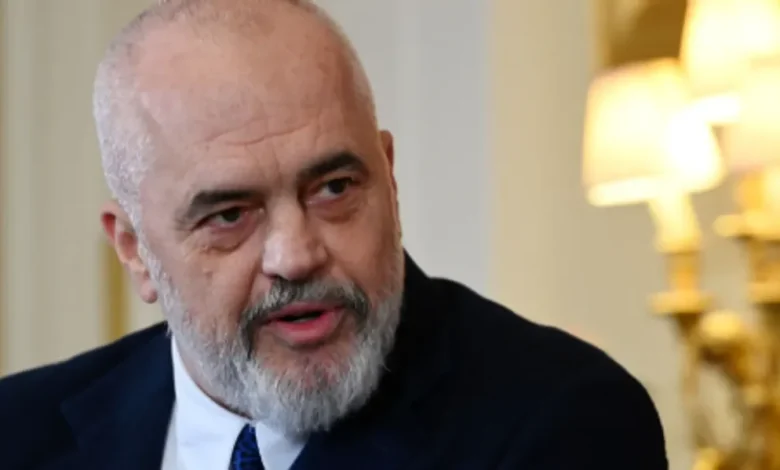‘There is no room for fear’, Rama interview for ‘Al Jazeera’: Russia will not attack any other European country

Prime Minister Edi Rama has given an interview to Al Jazeera, where he spoke about security in Europe, the war in Ukraine, and the role of the European Union and NATO in the region.
Rama has stated that Russia does not pose a threat to NATO member countries, including Albania, emphasizing that an attack on them would be “completely foolish.”
He has also criticized the EU’s lack of a clear peace plan for the conflict in Ukraine and called for more diplomatic engagement.
According to Rama, Albanians “are not afraid” and the country has no reason to feel pressure from Russia, while emphasizing that there should be more attention and security in the Balkans for the stability of the region.
Al Jazeera article:
Albania’s Prime Minister, Edi Rama, has allayed Western concerns that Russia is preparing for more conflicts in Europe and suggested that the European Union should have a concrete peace plan for Ukraine, at a time when the United States is trying to end the war.
Rama, speaking to Al Jazeera on the sidelines of the Berlin Global Dialogue conference late last month, said it would be “completely foolish” for any state to attack EU or NATO members.
“Russia will not attack Albania and Russia will not attack any other European country,” he said. “NATO is ready for any kind of aggression. NATO does not have to be afraid of anyone or anything, because it is the strongest army in the world by far.”
23 of the 27 EU member states are members of NATO. Albania is part of NATO and has been a candidate country for EU membership since 2014.
“The EU is being provoked a lot by Russia,” Rama said. “Countries that border Russia are being provoked every day … The EU is defending itself and thinking about how to defend itself even better.”
Since early September, several European countries, including Poland, Finland, Latvia, Lithuania, Norway and Romania, have accused Russia of a series of suspected drone incursions. Tensions rose further on September 19, when NATO said it had intercepted three Russian MiG-31 fighter jets suspected of entering Estonian airspace, a claim Moscow denied.
Last month, Germany’s foreign intelligence chief, Martin Jaeger, warned lawmakers that, in order to expand its “sphere of influence further west in Europe,” Russia “would not hesitate to avoid a direct military confrontation with NATO if necessary.”
Moscow has denied accusations that it deliberately sent drones into European airspace, blaming those countries for stoking hysteria.
The lack of a peace plan from the EU “seems very strange”
Rama’s government has been vocal in its criticism of Russia’s full-scale invasion of Ukraine and supports EU sanctions against Moscow.
But he told Al Jazeera: “The fact that the EU doesn’t have a peace plan seems very strange to me.”
As US President Donald Trump tries to secure a ceasefire between Russia and Ukraine, Rama said the EU should “think about having its own diplomacy in action to promote its own vision of peace.”
He also suggested that EU officials should “find a way to talk to the Russians” to end the war.
On Monday, Ukrainian President Volodymyr Zelensky said he had not seen any European plan to end the war, according to the Interfax news agency.
Rama stated that Albania, which has not reported any sightings of Russian drones, feels little pressure despite the apparent incidents, while Eastern European countries bordering Russia are on high security alert.
“I am Albanian,” Rama said. “We are not afraid … There is no place for Russian hostility in Albania, because there is no sympathy for Russia.”
Before the alleged airspace violations, Moscow had long been accused of engaging in “hybrid warfare,” using unconventional methods such as cyberattacks or disinformation campaigns to divide EU countries. Drone incursions are part of this tactic.
There are fears that Russia’s war could spread to the Western Balkans, which includes Albania, Bosnia and Herzegovina, the self-proclaimed republic of Kosovo, Montenegro, North Macedonia and Serbia, a region with deep historical tensions.
On October 22, when Rama was received by his British counterpart Keir Starmer along with five other Western Balkan leaders, the UK Prime Minister called the region “the cradle of Europe, the place where the security of our continent is tested.”
All six countries are at various levels of EU membership negotiations, trying to reform sectors from the judiciary to social welfare to become part of the bloc.
European Commission President Ursula von der Leyen recently praised the progress made by Montenegro and Albania.
In Tirana on October 25, at a press conference alongside Rama, she said that Albania is on “the right path towards the European Union,” adding that “there has been an extraordinary and impressive acceleration of the pace since 2022.”
Rama agreed, telling Al Jazeera that the EU’s stance towards Balkan countries and its willingness to welcome them has improved since the start of the war in Ukraine. /Tch/





